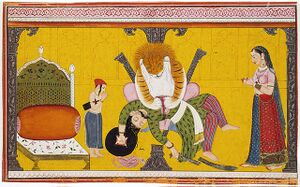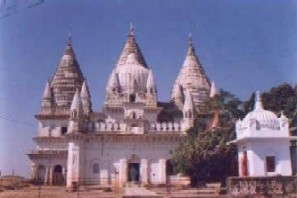Nrisimha

Nrisimha (नृसिंह), Narasingh, Narasinga (नरसिंह) is described as an incarnation (avatara) of Vishnu within the Puranic texts of Hinduism [1] who takes the form of half-man / half-lion, having a human torso and lower body, but with a lion-like face and claws.[2] He is worshipped in deity form by a significant number of Vaishnava groups throughout India (especially in the South) and is primarily known as the 'Great Protector', being a form of Vishnu who specifically defends and protects his devotees in times of need. [3]
Vishun's incarnation as Narasimha
Sandhya Jain[4] writes that tribal elements can be traced to the very core of Hindu dharma. Vishun's incarnation as Varaha and Narasimha bear the strong impress of the forest and reinforce tribal inputs into classical dharma. A L Basham[5] believes Varaha probably came from the people of eastern Malwa. Through out the tribal belt , Varaha and Narasimha are worshipped as uniconical symbols.
Scriptural background
References to Narasimha are found in a wide variety of the Puranic scriptures, with seventeen versions of the main narrative[6], some in more detail than others. The Bhagavata Purana (Canto 7), Agni Purana (4.2-3), Brahmanda Purana (2.5.3-29), Vayu Purana (67.61-66), Harivamsa (41 & 3.41-47), Brahma Purana (213.44-79), Vishnudharmottara Purana (1.54), Kurma Purana (1.15.18-72), Matsya Purana (161-163), Padma Purana (Uttara-khanda 5.42), Shiva Purana (2.5.43 & 3.10-12), Linga Purana (1.95-96), Skanda Purana 7 (2.18.60-130) and Vishnu Purana (1.16-20) all contain depictions of the Narasimha pastime. There is also a short reference in the Mahabharata (3.272.56-60) and an Upanishad (Narasimha tapani Upanisad) named in reference to him.
Narasimha and Prahlada

The story of Narasimha as described in the Bhagavata Purana is as follows:
In his previous avatar of (Varaha), Vishnu killed a rakshasa known as Hiranyaksha. Hiranyaksha's brother Hiranyakashipu, greatly angered by this, started to abhor Lord Vishnu and His followers. To which end he decides to attempt to kill Vishnu by gaining mystical powers, which he believes Brahma, the chief among the devas will award to him if he undergoes many years of great austerity and penance. This initially seems to work as planned with Brahma becoming pleased by Hiranyakashipu's austerities.[7] Brahma thus appears before Hiranyakashipu and offers him a boon that he will personally make true anything he wishes for. In reply to which Hiranyakashipu requests the following:
O my lord, O best of the givers of benediction, if you will kindly grant me the benediction I desire, please let me not meet death from any of the living entities created by you.
Grant me that I not die within any residence or outside any residence, during the daytime or at night, nor on the ground or in the sky. Grant me that my death not be brought about by any weapon, nor by any human being or animal.
Grant me that I not meet death from any entity, living or nonliving. Grant me, further, that I not be killed by any demigod or demon or by any great snake from the lower planets. Since no one can kill you in the battlefield, you have no competitor. Therefore, grant me the benediction that I too may have no rival. Give me sole lordship over all the living entities and presiding deities, and give me all the glories obtained by that position. Furthermore, give me all the mystic powers attained by long austerities and the practice of yoga, for these cannot be lost at any time.[8]
One day whilst Hiranyakashipu was performing austerities at Mandarachala Mountain, his home was attacked by Indra and the other devas[9], seizing the opportunity in his absence. At this point the rishi, Narada intervened in order to protect Hiranyakashipu's wife, Kayadu, who he describes as 'sinless'. [10] Following this event Narada takes Kayadu into his care and while under the guidance of Narada, her unborn child (Hiranyakashipu's son) Prahlada, became affected by the transcendental instructions of the sage even at such a young stage of development. Thus, Prahlada when later growing as a child began to show symptoms of this earlier training by Narada, gradually becoming recognised as a devoted follower of Vishnu, much to his father's disappointment.[11]
Hiranyakashipu eventually becomes so angry and upset at his son's devotion to Vishnu (who he sees as his mortal enemy) that he decides he must kill him[12] but each time he attempts to kill the boy, Prahlada is protected by Vishnu's mystical power. When asked, Prahlada refuses to acknowledge his father as the supreme lord of the universe and claims that Vishnu is all-pervading and omnipresent. To which Hiranyakashipu points to a nearby pillar and asks if 'his Vishnu' is in it:
"O most unfortunate Prahlada, you have always described a supreme being other than me, a supreme being who is above everything, who is the controller of everyone, and who is all-pervading. But where is He? If He is everywhere, then why is He not present before me in this pillar?"[13]
Prahlada then answers, He was, He is and He will be. In an alternate version of the story, Prahlada answers He is in pillars, and he is in the least twig. Hiranyakashipu, unable to control his anger, smashes the pillar with his mace, and then following a tumultuous sound, Vishnu in the form of Narasimha appears from it and in defence of Prahlada moves to attack his father. In order to kill Hiranyakashipu and not upset the boon given by Brahma, the form of Narasimha was chosen. Hiranyakashipu could not be killed by human, deva or animal, Narasimha is neither one of these, as he is a form of Vishnu incarnate as a part-human, part-animal. He comes upon Hiranyakashipu at twilight (when it is neither day nor night) on the threshold of a courtyard (neither indoors nor out), and puts the demon on his thighs (neither earth nor space). Using his sharp nails (neither animate nor inanimate) as weapons, he disembowels and kills the demon.[14]
Even after killing Hiranyakashipu none of the present demigods were able to calm Narasimha's fury, not even Shiva. So all the gods and goddesses called His consort, the goddess Lakshmi, but she was also unable to do so. Then, at the request of Brahma, Prahlada was presented to Narasimha, and finally, he was calmed by the prayers of his devotee.[15]
Based on this story it is believed by followers that Narasimha protects his sincere devotees when they are in cases of extreme danger and there are testimonies of people who were saved by Him to this effect. There is one story in which He saved Adi Sankara from being sacrificed to goddess Kali by a Kapalika. Thus Adi Sankara composed Laksmi-Nrsimha stotra.[16]
Narsinha temples built by Jats at Narsinghpur

Narsinghpur or Narsimhapur is a town in Madhya Pradesh state of central India. Narsinghpur is the administrative headquarters of Narsinghpur District.
Narsinghpur has a large temple of Lord Narsingh known as Narsingh Avatar Temple . This temple was constructed by Jat Sardar in the 18th century. Khirwar clan Jats came to this place from Brij and founded the city of Narsinghpur, where they ruled for a long period. Khirwars of Narsinghpur were followers of god Narsingh. Here they constructed two temples of Narsingh avatar. And this temple has got its importance as district's Nomenclature hails from here only. [17]
Narsinha temples built by Jats at Gohad
Singhandev (1505-1518) , The first Bamraulia Jat Ruler of Gohad was follower of Nrisingha and he built a temple of Nrisinha at Gohad in Bhind district of Madhya Pradesh. His state symbol was Nrisinha. [18]
References
- ↑ Bhag-P 1.3.18 "In the fourteenth incarnation, the Lord appeared as Nrisimha and bifurcated the strong body of the atheist Hiranyakasipu with His nails, just as a carpenter pierces cane."
- ↑ Bhag-P 7.8.19-22
- ↑ Steven J. Rosen, Narasimha Avatar, The Half-Man/Half-Lion Incarnation, p5
- ↑ Sandhya Jain:Adideo Arya Devata, A Panoramic view of Tribal-Hindu Cultural Interface, Delhi, 2004, p.8
- ↑ A L Basham:The Wonder That was India, Indian ed., 1963
- ↑ Steven J. Rosen, Narasimha Avatar, The Half-Man/Half-Lion Incarnation, p1
- ↑ Bhag-P 7.4.1 "Lord Brahma was very much satisfied by Hiranyakasipu's austerities, which were difficult to perform"
- ↑ Bhag-P, Canto 7 7.3.35-38
- ↑ Bhag-P 7.7.6 "The victorious demigods plundered the palace of Hiranyakasipu, the King of the demons, and destroyed everything within it. Then Indra, King of heaven, arrested my mother, the Queen"
- ↑ Bhag-P 7.7.8 "Narada Muni said: O Indra, King of the demigods, this woman is certainly sinless. You should not drag her off in this merciless way. O greatly fortunate one, this chaste woman is the wife of another. You must immediately release her."
- ↑ Bhag-P 7.8.6
- ↑ Bhag-P 7.8.3-4 "Thus he finally decided to kill his son Prahlada. Hiranyakasipu was by nature very cruel, and feeling insulted, he began hissing like a snake trampled upon by someone's foot."
- ↑ Bhag-P 7.8.12
- ↑ Bhag-P 7.8.29 "Lord Nrisimhadeva placed the demon on His lap, supporting him with His thighs, and in the doorway of the assembly hall the Lord very easily tore the demon to pieces with the nails of His hand."
- ↑ Bhag-P 7.9
- ↑ Sri Nakshmi Nrsimha Karavalamba stotra, by Adi Sankara Bhagawat Pada
- ↑ http://narsinghpur.nic.in/research.htm
- ↑ Jat-Scindia Sambandh (Gohad Ke Vishesh Sandarbh Mein) by Dr. Pradyumna Kumar Ojha, Publisher: Jat-Veer Prakashan Gwalior, 2014, p.51
Back to Jat Deities

